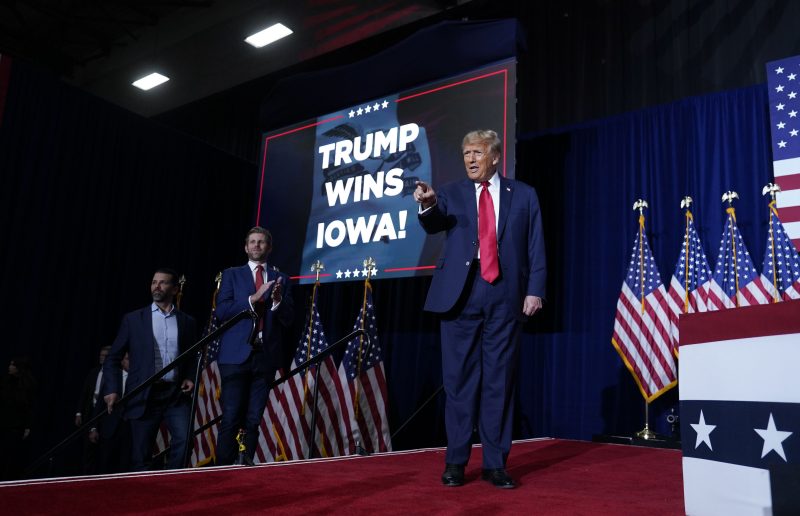
Trump was declared the winner in Iowa before many even cast their votes
DES MOINES — Across Iowa, Republicans were listening to political speeches and casting ballots in the state’s first-in-the-nation presidential caucuses. Supporters of former president Donald Trump hadn’t yet made it to his watch party. Not even the bartender had shown up.
Then, about 7:30 p.m. local time, smartphone screens around the state lit up with news alerts declaring that Trump was projected to win Iowa. The Associated Press had called the race, and many Republicans learned about it as they were still voting.
The decision sparked outrage from Florida Gov. Ron DeSantis, whose supporters portrayed the call as part of an attempt by the media to hobble his campaign.
“They threw everything but the kitchen sink at us,” DeSantis said in a speech late Monday. “They even called the election before people even got a chance to vote.”
But the lightning-fast declaration, which did not stop anyone from voting, highlighted how lopsided the race for the Republican nomination has been. In polls, Trump for months has enjoyed a double-digit lead in Iowa and elsewhere.
Those surveys were validated by the results Monday night, with Trump taking about half the total vote and beating his nearest competitor, DeSantis, by about 30 points.
Jeff Kaufmann, chairman of the Republican Party of Iowa, described the race’s early call “disappointing and concerning” in a statement to the Des Moines Register. “There was no need to rush one of the most transparent, grassroots democratic processes in the country,” he said.
The AP, which other news outlets have long relied on to project winners, said its data showed Trump had an insurmountable lead when it made the call, which came about a half-hour after the caucuses began. As the results rolled in throughout the night, Trump’s lead remained commanding.
The AP reported that it made its call by analyzing early returns and reviewing the results of a survey of those who planned to attend the caucuses. The results of both showed Trump’s lead could not be overcome, according to the AP.
Similarly, CNN reported that it made its own call on the race a half-hour after the start of the caucuses based on Trump’s overwhelming lead in the network’s entrance poll. Spokespeople for the AP and CNN offered no comment on the criticisms from DeSantis and his campaign.
Many news organizations look to the AP to call races. The Washington Post sent a news alert based on the AP’s call.
Ordinarily, the AP does not call races until after the last polling site is scheduled to close. For the caucuses, the AP treats the start of the caucuses as the equivalent of polls closing in states that conduct primaries. At caucuses, representatives of candidates can give speeches. How long it takes to begin the vote, turn in ballots and tally them can vary widely from one site to another.
The AP said it used initial results from eight of Iowa’s 99 counties that showed more than half of the votes going to Trump.
AP VoteCast, the news organization’s survey of more than 1,500 voters who said they planned to attend the caucuses, showed Trump with “sizable leads” among men, women, every age group and residents of different areas of the state, according to the AP.
Nonetheless, some voters cried foul, arguing that the news organization should have waited before making a projection.
Nancy Seliger, a volunteer for candidate Nikki Haley, saw the AP’s alert as votes were still being tallied at her voting site on the campus of Iowa State University in Ames.
“It’s irresponsible,” she said of the alert.
DeSantis’s team reacted in bitter terms. Campaign spokesman Andrew Romeo called it a form of “election interference,” declaring, “The media is in the tank for Trump, and this is the most egregious example yet.”
At a polling site in Clive, near Des Moines, voting started late because caucus-goers heard speeches from Trump, Haley, entrepreneur Vivek Ramaswamy and former Arkansas governor Asa Hutchinson.
“They already called the winner and we’re still waiting? It’s kind of ridiculous,” said BJ McLaughlin, a Trump caucus captain.
Jacob Reicks, a junior at Iowa State University, said he didn’t see any alert before he cast a ballot for Ramaswamy. He learned the news when he left his precinct. “I didn’t even think that they would announce it that early,” the 21-year-old said. “… It shocked me.”
At a precinct in Johnston, in suburban Des Moines, Trump supporters could be heard quietly celebrating when news of Trump’s victory was announced, even though results were still being tallied at their site.
Moments later, the caucus chair read out the results. Trump had won in their precinct.
Sabrina Rodriguez, Scott Clement, Hannah Knowles, Isaac Arnsdorf and Michael Scherer contributed to this report.
